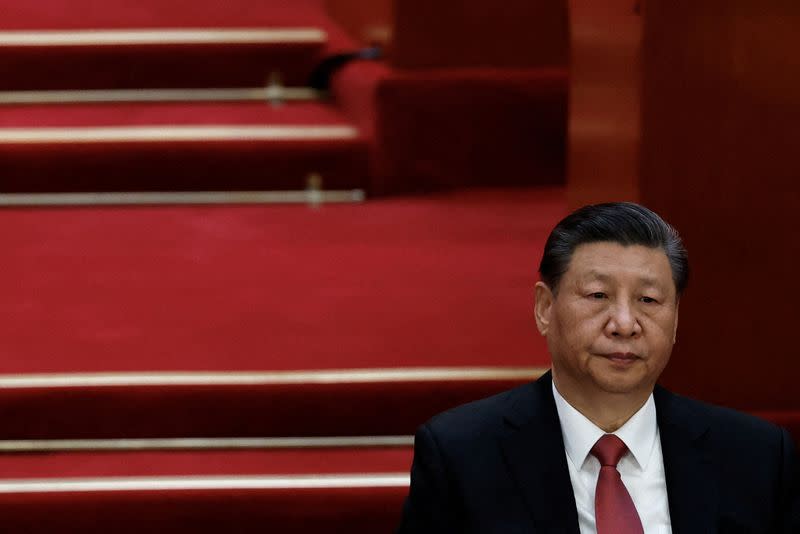Business confidence and profits of American and European firms operating in China have continued to plunge, with new reports showing optimism around operations in the world’s second-largest economy was at an all-time low.
Worsening geopolitical ties between Beijing and the West, along with the spiralling economic conditions in China have been the biggest drivers of the drop in business sentiment, with many firms especially disappointed about the lack of policy stimulus to revive the Chinese economy.
Only 47% of US firms were optimistic about their five-year China business outlook, a survey published on Thursday by the American Chamber of Commerce in Shanghai showed. The figure was down five percentage points from last year.
It was the weakest level of optimism reported since the AmCham Shanghai Annual China Business Report was introduced in 1999.
Also on AF: US Pressing Korean Chipmakers For More China Chip Curbs
Similarly, 44% of surveyed European business said they were pessimistic about their future profitability in China, according to the annual position paper of the European Union Chamber of Commerce in China. That was the highest level since records started in 2012, SCMP reported.
“It’s domestic demand, it’s deflation, and of course we can’t ignore the membership’s perceptions and concerns about geopolitics,” AmCham Shanghai Chairman Allan Gabor said.
“This touches investments and touches operating plans in China in terms of how we develop business plans in China for the future.”
The European Union Chamber of Commerce in China echoed those remarks.
“A tipping point has been reached, with investors now scrutinising their China operations more closely as the challenges of doing business are beginning to outweigh the returns,” Jens Eskelund, the chamber’s president, said.
“If you both have a complicated market, [and] your returns are lower than the global average, why China,” Eskelund was quoted as saying by the SCMP.
Profits at all-time-lows
A major dent to the business confidence of firms operating in China came from a significant fall in profits from operations in the country.
Only 66% of surveyed China-based US firms said they were profitable in 2023 — a record low.
Meanwhile, the European chamber said that profit margins in China had sunk for around two thirds of its members to equal to or below the global average.
The dwindling confidence has spurred steep drops in the foreign direct investment into China last year from both regions. While US FDI into China fell 14% to $163 billion last year, Europe’s FDI into the country dropped by a whopping 29% to $7.06 billion, official figures show.
Geopolitics continued to be the biggest concern for most American businesses operating in China. The two superpowers have been entangled in an intense trade and technology rivalry, with Washington cutting off exports of advanced chip technology to China and Beijing retaliating with a blockade on rare earth exports to the US.
The US is also expected to soon make its final determination on higher duties for Chinese-made products. The levies, announced by President Joe Biden earlier this year, include 100% tariffs on EVs, 50% on semiconductors and solar cells, and 25% on lithium-ion batteries, among others.
The tariffs were due to take effect on August 1, but have twice been delayed, at least in part due to concerns in the US about their impact on domestic firms.
Furthermore, uncertainty about the future of the relationship between the world’s top two economies has also been heightened ahead of the US presidential election.
The bilateral relationship was cited by 66% of respondents as their biggest challenge and by 70% as the greatest challenge to China’s economic growth.
Chinese economy concern, local competition threat
Around 40% of US firms also said they are currently redirecting or looking to redirect investment that had been earmarked for China, mainly to Southeast Asia, but also to India.
At least 60% US companies also reported favouritism toward local companies in China.
The EU chamber also noted that European firms must wrestle with Chinese competitors receiving unfair subsidies, a highly politicised business environment, President Xi Jinping’s heightened focus on national security, and perennial market access and regulatory barriers.
“With many other markets offering greater predictability and legal certainty along with the same return on investment, continuing to invest at previous levels in the China market is simply becoming harder to justify,” the chamber’s report read.
The “central concern” for European firms, however, was China’s economic slowdown.
At the start of the new millennium, reform plans announced by the Chinese government were seen by foreign companies as credible,” the EU chamber’s report said.
“Now, after more than a decade of largely unfulfilled pledges, doubts over China’s commitment to reform are increasing.”
Economists have repeatedly voiced concerns about a lack of policy action to reinvigorate China’s 1.4 billion-strong consumer market beyond a pledge from the top-decision making body of the ruling Communist Party in July that it will do so.
The EU chamber echoed those concerns.
“The government needs to look at what can be done for China to regain its position as a top location for European FDI,” the chamber’s Eskelund said.
- Reuters, with additional inputs from Vishakha Saxena
Also read:
China Giving Lethal Aid to Russia in Ukraine War, US Says
US Tech Firms Face ‘Death Spiral’ From New China Curbs: Lawmakers
US Ban on Investment Not Good For AI Sector, China Says
China, US ‘Narrow’ Gap on Climate Finance, Plan Methane Talks
US Revoked Eight Licences For Exports to China’s Huawei in 2024
US Business Outlook in China Sinks, Firms Looking at SE Asia
























